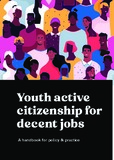| dc.contributor.author | Mpofu, David | |
| dc.contributor.author | Ndiweni, Michael | |
| dc.contributor.author | Moyo, Kwanele | |
| dc.contributor.author | Wadzai, Samuel | |
| dc.contributor.author | Oosterom, Marjoke | |
| dc.date.accessioned | 2022-03-15T15:28:31Z | |
| dc.date.available | 2022-03-15T15:28:31Z | |
| dc.date.issued | 2022-03-15 | |
| dc.identifier.citation | Mpofu, D.; Ndiweni, M.; Moyo, K.; Wadzai, S. and Oosterom, M. (2022) Youth Active Citizenship for Decent Jobs: A Handbook for Policy & Practice, Brighton: IDS and RAU, DOI: 10.19088/IDS.2022.017 | en |
| dc.identifier.isbn | 978-1-78118-963-4 | |
| dc.identifier.uri | https://opendocs.ids.ac.uk/opendocs/handle/20.500.12413/17238 | |
| dc.description.abstract | This Handbook has been created for development partners and civil society actors that design and implement youth employment interventions, particularly in contexts marked by fragility and political-economic crises. Youth employment programmes usually strengthen young people’s business and entrepreneurship skills.
They fail to consider the civic and political competencies needed by young people in order to negotiate fair, safe, and decent working conditions and influence the wider policy environment for decent work. The Handbook offers suggestions for integrating youth active citizenship strategies into youth employment interventions, thus building young people’s civic and political skills. Adopting these strategies will strengthen the capacities of young people to engage both private sector and government actors, foster inclusion, and strengthen coalitions that can influence a enabling environment for decent jobs for youth. Recognising that many young people start their trade and businesses in theinformal economy, the Handbook takes their experiences as the point of departure.
It is widely recognised that political economy matters for development and development interventions. This also applies to youth employment programming. Ideas in this Handbook recognise that politics influence youth employment opportunities. This is particularly the case in contexts commonly referred to as fragile, conflict-affected and violent settings (FCVS). Approaches to youth employment interventions need to respond to these dynamics to avoid that powerful actors capture them to serve their interests and avoid increasing risks to conflict. Moreover, the Covid-19 pandemic has proved that fragility is multidimensional and manifests in many countries across the globe. Early on in the pandemic, it quickly became clear that the informal economy would be hard hit. In addition, the challenging politics of FCVS influence opportunities for both formal and informal employment. | en |
| dc.language.iso | en | en |
| dc.publisher | Research and Advocacy Unit (RAU) and Institute of Development Studies (IDS) | en |
| dc.relation.ispartofseries | Handbook; | |
| dc.rights.uri | https://creativecommons.org/licenses/by/4.0/ | |
| dc.subject | Children and Youth | en |
| dc.title | Youth Active Citizenship for Decent Jobs: A Handbook for Policy & Practice | en |
| dc.type | Book | en |
| dc.rights.holder | Research and Advocacy Unit (RAU) and Institute of Development Studies (IDS) | en |
| dc.identifier.team | Power and Popular Politics | en |
| dc.identifier.doi | 10.19088/IDS.2022.017 | |
| dcterms.dateAccepted | 2022-03-15 | |
| rioxxterms.funder | Default funder | en |
| rioxxterms.identifier.project | Default project | en |
| rioxxterms.version | VoR | en |
| rioxxterms.funder.project | 9ce4e4dc-26e9-4d78-96e9-15e4dcac0642 | en |


